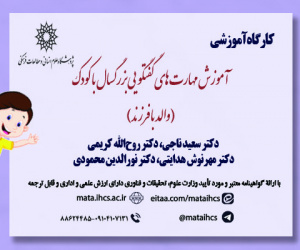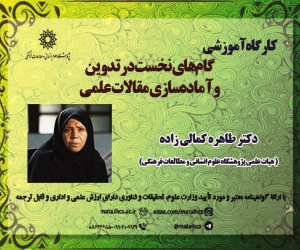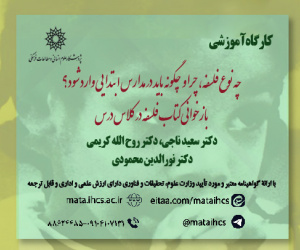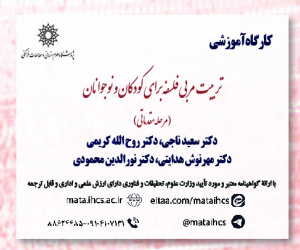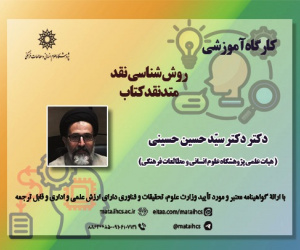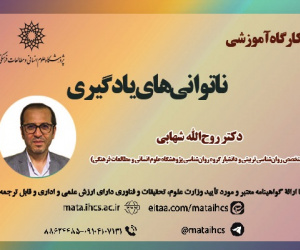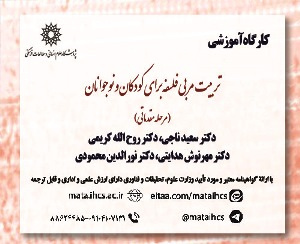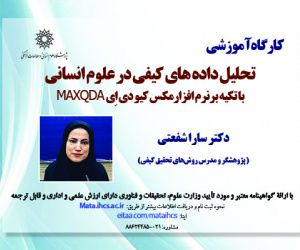درآمدی بر روش شناسی آینده پژوهی اسلامی (مقاله علمی وزارت علوم)
درجه علمی: نشریه علمی (وزارت علوم)
آرشیو
چکیده
یکی از مهمترین محورهای مطالعه رشته های علمی و تفاوت آنها با یکدیگر مسئله روش است. روش شناسی متکفل مطالعه و بررسی روش و قابلیت و اعتبار آن در دستیابی به واقعیت پدیده ها و تحقق اهداف دانشی است. برخلاف برخی دیدگاه ها که اهمیت روش را در شیوع استفاده آن نسبت به سایر ارکان علم (موضوع، غایت) می دانند، اهمیت یافتن روش و روش شناسی ناشی از جهان بینی مبتنی بر فلسفه دوره مدرن است. بنابراین، وقتی مبانی فلسفی مختلفی وجود داشته باشد، قلمرو موضوعات، مسائل، روش ها و در نتیجه روش شناسی نیز متفاوت خواهد بود. این پژوهش به تبیین روش شناسی آینده پژوهی اسلامی و برخی از روش های آن پرداخته است. روش و روش شناسی در آینده پژوهی اسلامی نیازمند چارچوبی از مبانی مبتنی بر مفاهیم اسلامی است. زیرا جهان بینی، معرفت شناسی و انسان شناسی متفاوت اسلام، قلمرو دیگری از معرفت را معرفی می کند و قلمرو موضوعات، مسائل و روش های معرفت را دگرگون می کند. در این راستا این پژوهش به بررسی مطالعات آیندهپژوهی اسلامی می پردازد و نسبت روش و روش شناسی آن را با آنچه در آینده پژوهی متعارف مطرح است، بررسی می کند. این کار در چند مرحله انجام می شود؛ ابتدا به معرفی مختصر جریان آینده پژوهی اسلامی و ماهیت آن پرداخته شده، سپس روش شناسی آن تبیین شده و موضوع تجربه و عقلانیت به عنوان دو روش رایج در آینده پژوهی اسلامی و آینده پژوهی رایج مورد بحث قرار می گیرد. در پایان، برخی روش های مبتنی بر چارچوب اندیشه اسلامی معرفی می شود. این مقاله از نظر داده ها و تحلیل آنها، پژوهشی کیفی است که بر اساس توصیف و تحلیل اطلاعات برگرفته از مطالعات آینده پژوهی اسلامی سامان یافته است. تحلیل جامع روش شناسی آیندهپژوهی اسلامی مستلزم ایجاد چارچوبی شناختی-هنجاری مبتنی بر مفاهیم اسلامی است. این چارچوب مجموعه ای از اصول کلی متافیزیکی، اصول خاص مربوط به دانش، فرآیندها و در نتیجه روش ها و ابزار تحقق است که به عنوان پارادایمی منسجم می تواند مبنایی برای نظریه پردازی، روش، روش شناسی و روش های عمل باشد. بر اساس دیدگاه سورل، این چارچوب دارای چهار عنصر است: ارکان چارچوب شناختی هنجاری سورل (2000, P.497) مهمترین ویژگی های روش شناسی آینده پژوهی اسلامی عبارتند از: - ابتنا بر مبانی معرفت شناسی اسلامی و عناصر علم شناختی مسلمانان - اعتبار توأمان روش های وحیانی، عقلی و تجربی و عدم انحصار در تجربه - تناسب روش با موضوعات مختلف - سازگاری با ارزش ها، اهداف و هنجارهای زیست دینی. اصل مشترک حاکم بر روش شناسی آینده پژوهی اسلامی، اعتبار توأمان روش های وحیانی، عقلانی و تجربی است و به دو دسته روش های «متن محور» و «غیرمتن محور» تقسیم می شود. روش شناسی دریافت از متن (متن محور) فنون جمع آوری اطلاعات از متون اسلامی و روش تجزیه و تحلیل و طبقه بندی آنهاست که مربوط به موضوع یا موضوعی از موضوعات و مسائل علوم انسانی است. هدف، کشف نظر و دیدگاه متون اسلامی در مورد آن موضوع یا موضوعات است. دو روش «تفسیر» و «تدبّر» از مهم ترین روش های این نوع روش شناسی هستند. روش شناسی غیرمتن محور به دنبال شناسایی ماهیت، علل و عوامل رویدادها، پدیده ها، کنش های انسانی و کشف روابط و همبستگی بین آن هاست. این روش شناسی بر محوریت عقل تأکید دارد. در قلمرو معرفت شناسی، عقل هم به عنوان منبع معرفت و هم به عنوان وسیله ای برای کسب معرفت مورد استفاده قرار می گیرد که خود در قالب انواع روش های توصیفی، تبیینی، استدلالی و تفسیری ظاهر می شود. نسبت سنجی یافته های عقلی با آموزه های دینی باید در چارچوبی منسجم، منظم و برخوردار از معیار موجه باشد. «مقاصد شریعت» و شناخت «اصول دین» بر اساس نظام ارزشیابی از مهم ترین مبانی این چارچوب است. بنابراین در آینده پژوهی اسلامی نه تنها روش های عقلانی و غیرمتن محور نفی نمی شود بلکه انواع روش های تفسیری، توصیفی، استدلالی، نخبگانی، آماری و مشاهده ای نیز مورد توجه قرار می گیرد. درعین حال عقلانیت در چارچوب قلمرو دین و توجه به حضور آن تبیین و تفسیر می شود.An Introduction to the Methodology of Islamic Future Studies
One of the most important elements of studying scientific disciplines and their differences from each other is the issue of method. Methodology is a branch of science that studies method. The importance of method and methodology is due to the worldview based on the philosophy of the modern period; therefore, when there are different philosophical principles, the scope of subjects, problems, methods, and as a result the methodology of knowledge will also be different. This research has explained the methodology of future studies and some of its methods. Therefore, the method and methodology in future studies require a framework of foundations based on Islamic concepts. The different worldviews, epistemology, and anthropology of Islam introduce another realm of knowledge and transform the realm of subjects, issues, and methods of knowledge. Therefore, because the principles of method and methodology of modern human sciences use different philosophical foundations, it causes conflict in two worlds of knowledge, so the Paradigm Shift can be used to explain this situation. This research examines the studies of Islamic futures studies and examines the ratio of its method and methodology with what is discussed in conventional futures studies. This is done in several stages; first, a brief introduction to the Islamic futures studies movement and its nature is given, Then its methodology is explained and the issue of experience and rationality as two common methods in Islamic futures studies and common futures studies is discussed; Finally, several methods based on the framework of Islamic thought are introduced. In terms of data and their analysis, this article is a qualitative research that was organized based on the description and analysis of information taken from Islamic futures studies and was organized based on the following steps;
Inspired by the "normative-cognitive framework", the comprehensive analysis of the methodology of Islamic futures studies requires the establishment of a cognitive-normative framework based on Islamic concepts. This framework is a set of general metaphysical principles, specific principles related to knowledge, processes, and as a result, methods and means of realization according to this consistent paradigm, which can be a basis for theorizing, method, methodology, and methods of action. According to Sorel's point of view, this framework has four elements, the connection and combination of which creates the textual paradigm.
The elements of Sorel's cognitive-normative frames (2000: 497)
The most important characteristics of the methodology of Islamic futures studies are:
- Based on the principles of Islamic epistemology and Elements of Muslim Scientology;
- Validity of revelatory, rational, and experimental methods and non-exclusivity in experience;
- Suitability of the method to the appropriate subjects;
- Compatibility with intentions, goals, and norms of religious life.
The common methodological principle of future studies is the combined validity of revelation, rational, and experimental methods and it is divided into two categories "text-oriented" and "non-text-oriented" methods. The methodology of receiving from the text (text-oriented) is the technique of collecting information from Islamic texts and the method of analyzing and classifying them, which is related to a topic or issue from the topics and issues of human sciences. The goal is to discover the opinions and viewpoints of Islamic texts about that subject or issue. The two methods of exegeses (tafsir) and pondering over the meaning of the verses of the Qur'an "Tadabbur" are the most important methods of this type of methodology. Non-text-oriented methodology seeks to identify the nature, causes, and factors of events, phenomena, and human actions and discover the relationships and correlations between them. This methodology emphasizes the centrality of reason. In the realm of epistemology, reason is used both as a source of knowledge and as a tool for obtaining knowledge, which itself appears in the form of various types of descriptive, explanatory, argumentative, and interpretive methods. The comparison of rational teachings with religious teachings must have a disciplined framework; Maqasid-e-Shari'at (Objectives of Islamic Laws) and understanding "principles of religion" based on the evaluation system are the most important foundations of this framework. Therefore, rational methods are not negated in Islamic future studies, and various types of interpretive, descriptive, argumentative, elite, statistical, and observational methods are taken into consideration in Islamic future studies. But rationality is explained in the framework of the realm of religion and paying attention to its presence.

